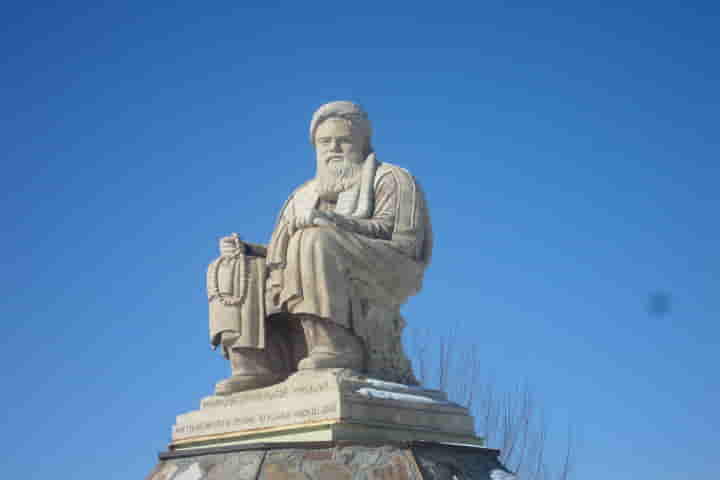While a Taliban spokesperson was assuring the Afghans about their safety on Tuesday, Taliban fighters had blown up the statue of Hazara leader Abdul Ali Mazari in the Bamiyan province. The flatlands of Bamiyan, over which two giant Buddha statues, blown up by Taliban two decades ago, kept vigil, can be reached from Kabul across the famous Salang pass. The area is home to Hazaras—a Shia ethnic community with deep historical ties with Iran. The Taliban had executed Mazari in 1995.
“So, Taliban have blown up slain #Hazara leader Abdul Ali Mazari’s statue in Bamiyan. Last time they executed him, blew up the giant statues of Buddha and all historical and archaeological sites. Too much of ‘general amnesty,” says Human rights activist Salim Javed in his post sharing the pictures. The incident is a grim reminder of the blowing up monumental Buddha statues in Afghanistan’s Bamiyan Valley in 2001 by the Taliban.
When #Taliban blew up the irreplaceable Bamiyan Buddhas in 2001, they'd just conducted a PR campaign:
-They'd sent a delegation to Washington. US govt officials (incl me) met with them.
-Their case: UNESCO protects statues, but UN won't give food aid? [UN did. But TB didn't care] https://t.co/T8McAFkMHA— Jonah Blank (@JonahBlank) August 18, 2021
Abdul Ali Mazari was the political leader of the Hezb-e Wahadat party during and following the anti-Soviet Jihad of the eighties. More than a decade after his murder, Mazari was posthumously given the title ‘Martyr of National Unity’.
The Hazaras are descendants of Genghis Khan, the founder of the Mongol empire, and the Mongol soldiers who swept through the region in the 13th century.
When the Islamist extremists last ruled Afghanistan, they brutally persecuted the Hazara ethnic and religious minority.
In Taliban 2.0, group’s spokesperson has been assuring the Afghans that the group would not indulge in ethnic killings. We have pardoned anyone, all those who had fought against us. We don’t want to repeat any conflict anymore. We want to do away with the factors for conflict. Therefore, the Islamic Emirate does not have any kind of hostility or animosity with anybody; animosities have come to an end and we would like to live peacefully. We don’t want any internal enemies and any external enemies,” said Taliban spokesman Zabihullah Mujahid in Kabul on Tuesday.
But another Hazara leader and Afghanistan’s one of three female district governors, Salima Mazari has been missing since the fall of her district Chaharkint, Balkh province. According to locals Salima was captured by the Taliban fighters after the fierce fighting between her troops and the Taliban.
“Hazara sources confirms #SalimaMazari is now in #Taliban custody. She is the #Hazara district Governor of Chaharkint, Balkh. HOPE is worried about her safety and do not know about her current whereabouts”.
Hazara sources confirms #SalimaMazari is now in #Taliban custody. She is the #Hazara district Governor of Chaharkint, Balkh. HOPE is worried about her safety and do not know about her current whereabouts. pic.twitter.com/7N5Md2Lcxe
— HOPEhazara (@HOPEhazara) August 15, 2021
While the top Afghan leadership and commanders including former Afghan president Ashraf Ghani fled the country or surrendered to the Taliban, Salima Mazari fought till she was captured. Now no one knows about the fate of Afghanistan's first female governor. Last week, before the fall of Mazar-e-Sharif, Salima had expressed fears about a Taliban takeover to the Associated Press (AP).
“There will be no place for women,” said Mazari, who governs a district of 36,000 people near the northern city. “In the provinces controlled by the Taliban, no women exist there anymore, not even in the cities. They are all imprisoned in their homes.”
Salima Mazari was shown in the media with her fighters on the front line of her district fighting the Taliban.
“Salima Mazari was captured by the Taliban. After the surrender of Balkh, Chahar Kent district has also fallen to the hands of Taliban and Salima Mazari, the governor of this district, captured by the Taliban fighters.” says Hamid Haidari, an Afghan journalist.
Salima Mazari was captured by the Taliban. After the surrender of Balkh, Chahar Kent district has also fallen to the hand's of Taliban and Salima Mazari, the governor of this district captured by the Taliban fighters. pic.twitter.com/pfmnl627Ui
— Hamid Haidari (@Hamidhaideri) August 15, 2021
The Taliban has been repeatedly saying that the group has given “general amnesty” across the country even for those who fought against them and there won't be any revenge killings.
But ethnic groups like Hazara are worried, an easy target for the Sunni-Shia sectarian divide.
Also Read: Taliban strike softer note on women’s rights at first press briefing after taking over Kabul




















